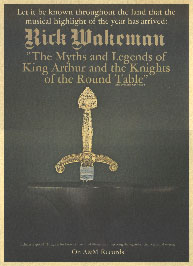![]()
  |

The Myths and Legends of King Arthur and the Knights of the Round Table
Rick Wakeman
A&M SP-4515
Released: April 1975
Chart Peak: #21
Weeks Charted: 5
 Hey, I saw "Camelot" on Broadway with Robert Goulet and everything and I don't remember a one of these songs being in it.
Hey, I saw "Camelot" on Broadway with Robert Goulet and everything and I don't remember a one of these songs being in it.
Seriously, though, folks, it looks like Rick Wakeman is developing into a composer of at least the magnitude of Dmitri Tiomkin. King Arthur, unlike either of its predecessors, actually contains a coupleof memorable melodies ("Arthur" and "Sir Galahad," significantly enough) and a couple of attempts to write some real music. These attempts -- two ersatz madrigals -- fail but show that Wakeman's heart is in the right place.
 Click image for larger view. |
The sixth century A.D. when Arthur supposedly reigned, is not well documented by music, but Wakeman's score here is more reminiscent of mid-Fifties cinematic excess than brilliant 12th-century school of medieval polyphonists who were England's first composers of note. (If you're interested in them, Nonesuch has just released an album of The Worcester Fragments, vocal music from some laboriously reconstructed manuscripts found decaying in the cathedral there.)
It is wrong for me to criticize Wakeman too heavily, though. He is writing ultra-light entertainments, not without their cynical edge, methinks. These entertainments are popular with a group of people who I suspect are afraid of real classical music and they keep Wakeman in beer. Still, the lure of the Arthurian legend to somebody with a genuine scholarly interest and a rock background must remain and I suspect something a bit heavier than this could be made of it. Jimmy Page, are you listening?
- Ed Ward, Rolling Stone, 6-19-75.
Bonus Reviews!
The legend of King Arthur has turned to schlock right before our eyes and will again. Even Mark Twain lost his perspective in trying to exploit this particular motif, although his business about the bicycles -- at least if you could get it in the old Classics Illustrated comic-book version -- was easier to take than Richard Burton's singing and Robert Goulet's acting in "Camelot" and everything but Maria Schell in "The Hanging Tree." Small wonder, though, that Rick Wakeman, the Ken Russell of sound, should get around to this. Just think of all the costumes; not even The Six Wives of Henry VIII could match it there, being stuck indoors so much. This time Wakeman has written lyrics -- well, words -- and got some orchestral and choral help to back his keyboard evocations of How It Must Have Been. His ideas concerning How It Must Have Been seem, as usual, to be based on the feeling that it included a lot of sound-effects blipping from one side of the room (or the greensward or whatever it was) to the other. If he were demonstrating how the old ping-pong days of early stereo must have been, it would make a little more sense. There's also a little lyrical piano here and there, and the kind of moon-June lyrics the subject of Camelot always seems to inspire. I could hardly wait for the Norman Conquest.
- Noel Coppage, Stereo Review, 10/75.
Some days you put a record on and wonder just what is happening to the music business. Rick Wakeman, keyboard genius, is really getting too carried away for his own good. I thought that Journey To The Centre Of The Earth was a piece of drivel, but compared to The Myths and Legends Of King Arthur and the Knights Of The Round Table it was absolutely magnificent. If Wakeman takes these concept pieces one step further he's going to find himself in the production booth, hardly noticeable on the record at all.
The thing that was good about The Six Wives Of Henry the VIII was that it was a legitimate solo album by an excellent keyboard player. Journey took this one step further by adding a narrator, an orchestra and a choir. And now, King Arthur is so full of diversions that it's almost possible to miss Wakeman's playing entirely. After listening to the album, I remembered absolutely nothing about Wakeman's work. I remember the pompous narration by the terrible man who went along on the Journey To The Centre Of The Earth tour, the same terrible singers, the same whining choir and my God, old King Arthur, who certainly suffered enough in his time at the hands of Lancelot, Guinevere and Mordred, has now got to put up with the atrocities of this album.
Usually I try to find something positive to say about Rick Wakeman, mainly because he's an absolutely charming man, but this time I can't even try to justify it. I wish Wakeman would go back to just playing keyboards and stop trying to write for the Easter Show at Radio City Music Hall... all gloss and no depth or quality.
- Janis Schact, Circus, 8/75.
Just as ambitious as Journey to the Center of the Earth, this album breaks little new ground. Essentially more of the same, with a little less freshness this time out since it is the second album of its kind. * *
- Bruce Eder , The All-Music Guide to Rock, 1995.
![]() Reader's Comments
Reader's Comments
No comments so far, be the first to comment.